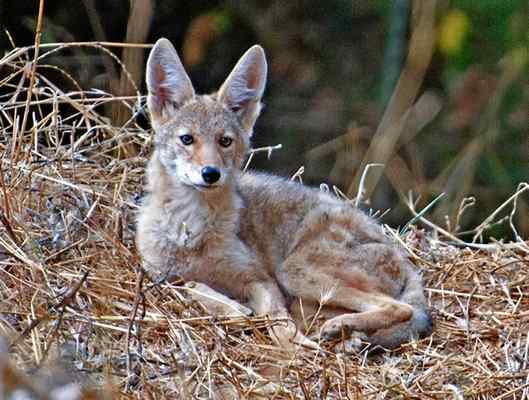Above: A young coyote in Larkspur. (Photo by Monte Deignan)
By Peter Coyote and Camilla H. Fox
As representatives of Project Coyote, a nonprofit organization based in Mill Valley that promotes coexistence between people and predators, we must respond to a hyperbolic opinion piece (Marin Voice, July 17) about the dangers of coyotes.
The opinion piece questions the effectiveness of a non-lethal coyote coexistence model that has been lauded by conservationists, scientists, ranchers and government officials for its documented continuous reduction in coyote conflicts in Marin County. At the same time, the piece makes no mention of the disastrous collateral damage of lethal control — the poisoning and trapping of pets and other species, as well as the potential death of other animals that might feed on a poisoned corpse.
There is little reason for alarm, and there are many reasons to welcome the coyote to our communities, despite the fact that their presence may require some common-sense precautions.
As opportunistic omnivores, coyotes occasionally prey on free-roaming domestic animals, but their primary diet includes rodents, rabbits, insects, fruit, berries and lizards. An increase in coyote sightings does not indicate a population boom, but simply the presence of coyotes in an area. Scientists have demonstrated unequivocally that rather than eliminating conflicts with livestock and pets, lethal control of coyotes may actually increase coyote populations by disrupting their social structure. Consequently, opportunities for conflict rise. Essentially, indiscriminate killing of coyotes creates a vacant niche that will quickly be filled by other coyotes less experienced in living peacefully with people.
A knee-jerk response to coyote sightings and occasional conflicts makes a poor basis for public policy. Marin County’s model approach to living with coyotes and other wildlife is based on sound science and an informed community.
The Marin Coyote Coalition, which consists of Marin Humane, Marin County Parks, Project Coyote and WildCare, backs science-based education that empowers residents with the tools needed to live alongside coyotes and reduce the possibility of conflict. This approach is designed to keep people, pets and wildlife safe. Fortunately, it just requires a little common sense and active participation on the individual and community level.
Practicing responsible safety measures is not difficult. Walk dogs on a leash, especially during pupping season (April-August), keep cats indoors, and supervise small pets and children while outdoors. Coyotes are most active at night and shy away from people, but seeing a coyote in broad daylight is not unusual nor cause for concern. “Hazing” bolder coyotes will keep them at bay: Don’t run if approached by a coyote — make noise, look big, and walk toward the animal until it retreats. If you’re concerned about a particular coyote, report sightings and complaints to Marin Humane at 415-883-4621.
Remove coyote attractants. Conflicts most often result when people feed wildlife or fail to secure garbage and compost. Remove pet food from yards, clean dirty grills and pick up fallen bird seed (which can attract rodents) and fruit.
Coyotes are here to stay. They have existed in North America for thousands of years despite extensive persecution — a testament to their intelligence, adaptability and resilience. The best available science shows that coyotes are a valuable native carnivore that provide myriad benefits, including controlling rodent populations (one coyote can consume up to 1,800 rats, mice and ground squirrels in a year) and rodent-born zoonotic diseases.
In addition, as the apex predator in some urban landscapes, coyotes limit mesocarnivore populations including skunks, raccoons, foxes, and feral cats through competitive exclusion, thereby benefiting ground and song bird population diversity and abundance.
Project Coyote works with communities nationwide to develop practical means of living safely and peacefully with coyotes and other wildlife. We urge residents who want to learn about our Coyote Friendly Communities program and find other helpful information to visit projectcoyote.org.
Peter Coyote of Mill Valley is an actor, author and ordained Buddhist priest and serves on the advisory board of Project Coyote. Camilla H. Fox of Larkspur is the founder and executive director of Project Coyote and co-author of “Coyotes In Our Midst.”
Download the article here.

